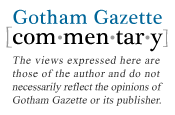When I was an assistant principal a teacher often would send a kid into my office when he was misbehaving. I'd threaten to bring his mother up to school, and he'd promise not to be "bad" anymore.
For six years the Joel Klein administration at the Department of Education has been promising not to be "bad" anymore.
Last November a constituent came into my community office. Her son had a disability and had been in special ed classes his whole school career. When he started high school, he was not put into a Special Education class. So, he was failing all his classes and getting into increasing difficulties. When she complained to the school she was told there was "no room in the special ed classes." She called the city's "311" non-emergency hotline and was told the same thing.
After three decades as a teacher and assistant principal, I knew who to call -- and did -- and the school reluctantly placed the student in the correct class.
Another parent applied to the new small schools housed in what had previously been a large high school across the street from her home, but her child wasn't accepted to any of the schools. "Too bad," said the department. "You can appeal, but we rarely uphold appeals, and, it's only a 45-minute bus ride to the assigned school.'
When my colleague, Linda Rosenthal, who represents the Upper West Side of Manhattan, asked a Klein staffer why the department failed to plan for the sharp increase in kids entering school, the staffer went on and on about demographic studies. Linda responded, "Why didn't you count baby strollers?"
These incidents, and other like them, point to an overall problem with the city's running of its school system.
As a member of the State Assembly, serving on the Education Committee, I should be able to communicate with appropriate department officials in regard to department polices, information, school data -- the information necessary to formulate legislation. My experience has been that the department dissembles, ignores and marginalizes parents; it has been with a department that is simply arrogant. Attempts to get information about schools in our district are shunted to the press office.
The current system isn't working. Klein keeps promising not to be "bad," without changing any behavior. It's time for the legislature to impose changes.
Fixing the Problems
While some of my colleagues call for allowing mayoral control to expire, I believe the mayor should retain control, but with significant changes to the law.
-- Members of the Panel for Educational Policy, a.k.a the central board, should be appointed after vetting by a screening mechanism, similar to how local bar associations screen judicial candidates. They should then be selected by the mayor, borough presidents, the public advocate and the speaker of the City Council. The mayor should appoint five members of the panel for fixed terms, and every borough president and the City Council speaker should each appoint one member. The mayor also should name the chancellor.
-- An independent organization with subpoena powers should be formed. It should release regular reports on student achievement and fiscal data, and be jointly led by the state commissioner of education and the state comptroller. All Department of Education student data, with appropriate protection to ensure confidentiality, should be available to the public for research purposes.
-- Community and high school superintendents should actively monitor student progress, meet regularly with parents and community representatives and supervise all school staff under their purview.
-- Community Education Councils, a.k.a. Community School Boards, should participate in the selection of superintendents and principals. They should evaluate the performance of the superintendents and make recommendations to the chancellor. They also should be consulted in a timely manner on all zoning issues such as the opening and closing of all schools, including charter schools. Each district should maintain a District Leadership Team that complies with state Department of Education regulations. School and district leadership teams should be able to appeal decisions of the chancellor to the state commissioner of education, who would then resolve complaints in an expedited fashion.
While the chancellor likes to call the former Community School Board system a "failed system," he is incorrect. Some schools districts were models of parent and community involvement with superb student achievement while others were dismal failures.
-- An independent Office of Parent and Community Advocacy should be created to resolve parent issues and complaints, train parent school leaders and act as a liaison with community organizations.
It is time to change the law, to remind the mayor and the chancellor that children and families are not widgets. The system must both respond to them and involve them so that Klein can finally uphold his promise not to be "bad" anymore.
Alan Maisel, a former schoolteacher and assistant principal, is a Democratic member of the State Assembly, representing District 59 in Brooklyn.





